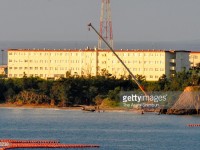
Stephen Harner, Former US State Department Official
Nov 30, 2015
In Tokyo, the Abe government is creating a new base in which the use of any U.S. air, sea, or ground forces will be unrestricted. Part of the Obama administration’s aim to maintain unchallengeable American military supremacy in East Asia, the construction of this base is already increasing tension throughout the region.
Jin Liangxiang, Senior Research Fellow, Shanghai Institute of Int'l Studies
Nov 27, 2015
While outside interference in Middle Eastern affairs has done nothing to improve the employment situation, build strong and efficient political structure, and prompt a solid union against terrorism, a kind of regional security structure including major regional powers and external powers is urgently needed. In this regard, the U.S. can do a lot, and China’s Belt and Road Initiative should be another opportunity for a fresh approach.

Sourabh Gupta, Senior Fellow, Institute for China-America Studies
Nov 26, 2015
Manilla’s arbitration requests in the South China Sea concern the standing of “historic rights”; the status of certain land features in these waters and the maritime entitlements they are capable of generating; and the lawfulness of certain Chinese land reclamation and law enforcement actions. Likely neither Beijing nor Manilla will walk away dejected, however.
Stewart Taggart, Founder & Principal, Grenatec
Nov 25, 2015
Manila’s just-completed Asia Pacific Economic Cooperation (APEC) consisted of two parts. The official summit agreed on the need to fight terrorism, enhance economic growth, reduce poverty and increase climate change resiliency. Unofficially, the huge political gulf between the U.S. and China over the South China Sea was on display.

Fu Xiaoqiang, Vice President, China Institutes of Contemporary International Relations
Nov 25, 2015
The U.S. must shoulder the responsibility of uniting the civilized world against terrorists and extremists, leading an effort to set aside differences among allies so that they can focus on a whole-hearted effort to eliminate this global threat.
Wen Bing, Senior Researcher, Academy of Military Science
Nov 23, 2015
The Chinese government believes that development is key in solving all problems in China: Development is the foundation for security, and security is the guarantee for development while China seeks political solutions through peaceful consultations, opposes intervention into other countries’ internal affairs, and promotes the global governance system to be more equitable and reasonable.
Chen Jimin, Guest Researcher, Center for Peace and Development Studies, China Association for International Friendly Contact
Nov 19, 2015
There must be a fundamental policy shift embraced by all countries to eliminate the breeding ground of terrorism and violent extremism. Eradicating poverty, achieving balanced global development, strengthening the effectiveness and inclusiveness of global governance mechanisms, and showing respect for the rights of peoples to choose the development road are the essential policy objectives.
Wu Zurong, Research Fellow, China Foundation for Int'l Studies
Nov 18, 2015
Mutual respect for sovereignty and territorial integrity is the basic norm of international relations. The US is duty-bound to make a careful study of China’s solemn position on this vital issue and show proper respect for China’s sovereignty instead of taking provocative actions based on contrived legal interpretations.

Wu Sike, Member on Foreign Affairs Committee, CPPCC
Nov 17, 2015
If big powers show courage and set aside their differences, and work together in a just, balanced intervention under the framework international law, they will not only help the Syrians out of hardship and avoid long-term instability in the region, they may also find a new way to prevent similar armed conflicts in the future.

Richard Weitz, Senior Fellow, Hudson Institute
Nov 13, 2015
Richard Weitz reviews the recent speech of U.S. Defense Secretary Ashton Carter, who describes China’s potential to challenge the U.S.-built international order through its assertive stance in the South China Sea, and finds his approach sensible, given the mixed and fluid strategic relationship between the two countries.
Back to Top

- China-US Focus builds trust and understanding between the U.S. and China through open dialogue among thought leaders.
- Our Offerings
- Topics
- Videos
- Podcasts
- Columnists
- Research Reports
- Focus Digest
- Stay Connected
-
Thanks for signing up!
- Get the latest stories from China-US Focus weekly.